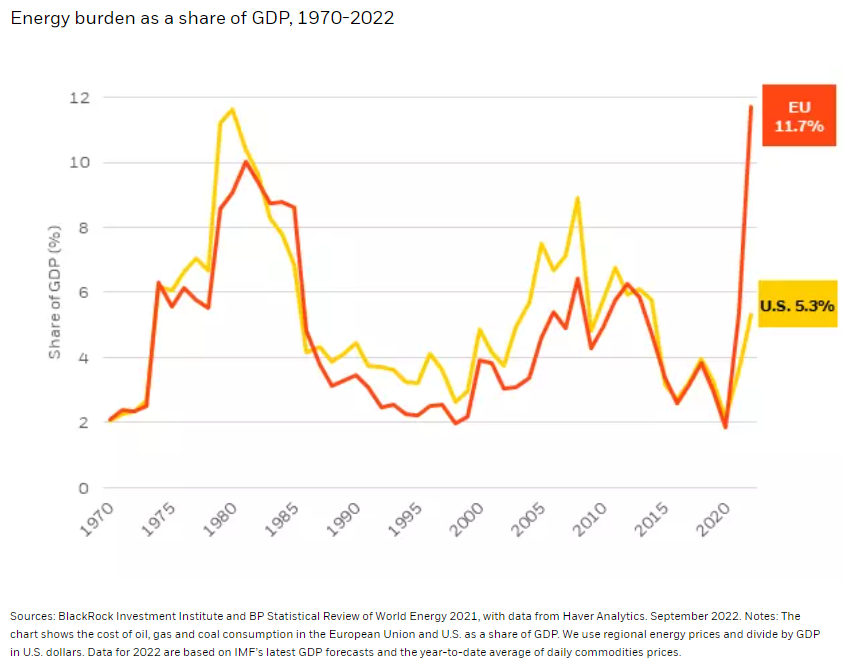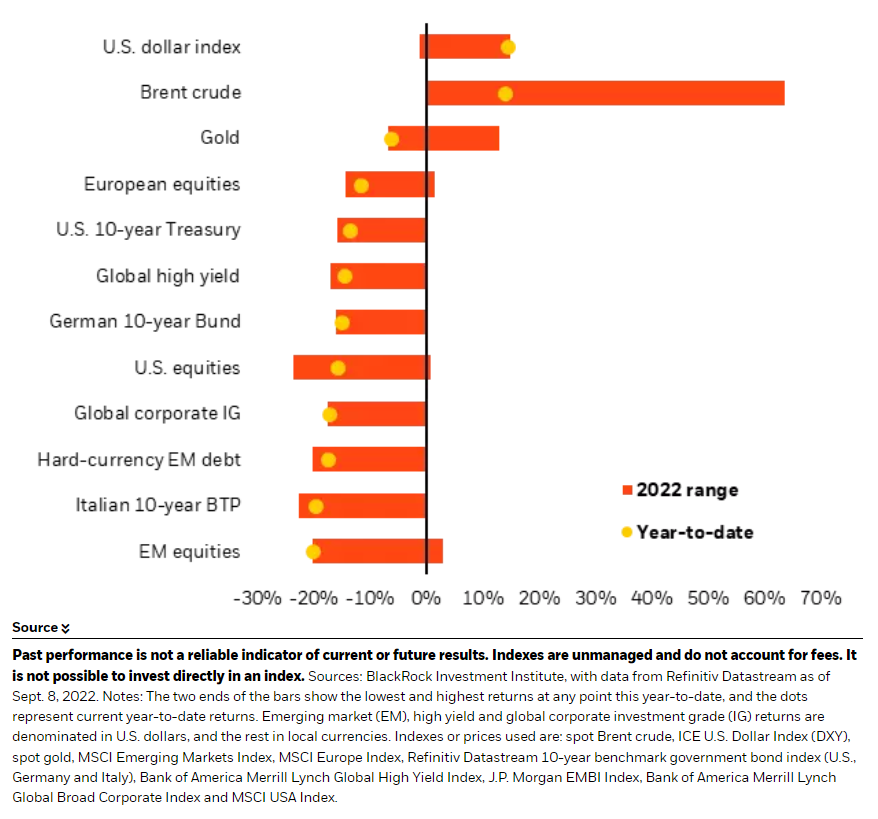Wei Li, Global Chief Investment Strategist at the BlackRock Investment Institute together with Alex Brazier, Deputy Head, Beata Harasim, Senior Investment Strategist and Nicholas Fawcett, Macro Research, all forming part of the BlackRock Investment Institute, share their insights on global economy, markets and geopolitics. Their views are theirs alone and are not intended to be construed as investment advice.
Key Points:
Energy shock: We think the energy crisis will spur a recession in Europe. The ECB is trying to fight inflation without recognizing the costs. We prefer credit over equities.
Market backdrop: The ECB raised rates by a record 0.75%. We think the ECB will keep raising rates through year-end until the economic effects of the energy crunch are clear.
Week ahead: All eyes are on U.S. CPI inflation for signs of further easing, especially core inflation. We expect inflation to cool but still settle above pre-Covid levels.
The energy crunch will drive a recession in Europe, as we’ve argued since March. The crisis has worsened since then as Russia has halted gas supplies. Plus, the European Central Bank (ECB) isn’t acknowledging how it will crush activity further by trying to fight high inflation, in our view. We think the ECB will wake up to this reality sooner than markets expect – but not before it inevitably faces a severe recession. We remain underweight equities and prefer high-quality credit.
Europe’s energy squeeze

Europe’s efforts to wean itself off Russian energy have triggered a price surge that’s been amplified as Russia cuts gas supplies. The European Union is now spending nearly 12% of its GDP on energy, making the crisis worse than the 1970s oil shocks. See orange line in the chart. That’s not the case for the U.S, a net energy exporter (yellow line). It’s hard to see any relief for Europe in the next couple of years, with rationing on the horizon, in our view. Winter may cause demand to surge, slashing stockpiles. Countries are rushing to cushion pressure, especially on households. Germany plans to collect excess profits from energy providers and cap prices. EU energy ministers have called for similar policies. The UK has a sizable plan to pay energy suppliers the difference between a new capped price and the price they would have been able to charge.
The euro area policies are much smaller than those in the UK or for Covid-19. That reinforces why the energy shock will drive a protracted recession lasting several quarters in Europe, in our view. The ECB is set to make things worse: Like the Federal Reserve, the ECB hasn’t acknowledged the damage it must do to growth to fight this inflation, even after it hiked a record 0.75% last week. The ECB is instead responding to the politics of energy-driven headline inflation, we think. Its new forecast for modest growth next year is already stale by not accounting for recent events like Russia cutting off gas supply. We see the ECB’s downside scenario of a -0.9% contraction as more likely. The euro sliding to 20-year lows against the U.S. dollar reflects deteriorating growth and terms of trade from higher energy prices, in our view.
European Central Bank view
The ECB will also have to contend with fragmentation risks – and perhaps put into practice its anti-fragmentation tool for peripheral debt spreads. Italy’s economic fundamentals have worsened in this shock, with the shift to a current account deficit amid its heavy debt burden. That’s more likely to feed volatility for Italian bonds, even if the coming election likely results in a center-right government that won’t be very antagonistic to the EU.
We think the ECB will keep up its aggressive rate hikes through the end of 2022 but then stop once it sees the economy taking a major hit. Year-end rates will likely stand somewhat short of current market rate expectations, in our view.
Bank of England view
Unlike others, the Bank of England (BoE) has been clear that bringing inflation down to target would require a deep recession. The UK’s fiscal plans wouldn’t change that, in our view. The measures are just another example of governments responding to the politics of high inflation. The subsidies may slow headline inflation and cushion the recession blow in the near term. But they can’t solve the imbalance of low supply relative to demand – and in fact block the fall in demand required to reduce inflation. Limiting the hit to real household incomes reduces the growth drag the BoE would have expected. That implies the BoE will keep hiking rates to get demand back in line with supply but not as much as markets expect, in our view.
Our bottom line
European stocks aren’t priced for the deep recession we expect. Excluding commodities, European earnings growth estimates are too optimistic, we think. We stay underweight European and most developed market stocks. We prefer investment grade credit as yields better compensate for default risk. We’re neutral European government bonds and have a modest overweight to UK gilts with a preference for short-dated bonds due to markets pricing in an overly hawkish rate path.
Market backdrop
Volatility persists across markets – underscoring the new regime of heightened macro volatility. The ECB hiked rates a record 0.75% and cut its growth forecasts last week. Yet the ECB’s new growth forecasts still don’t reflect the deep recession we expect from the energy shock and higher rates. We see the ECB jacking up rates through year-end but then stopping as the economic toll from the energy shock and rate hikes becomes clear.
The focus this week is on whether U.S. core inflation is slowing further or staying at elevated levels. The consensus sees the core CPI holding fairly steady, up by shelter costs, even if headline inflation likely cools on lower gasoline prices. The Bank of England policy meeting previously set for Sept. 15 has been rescheduled after Queen Elizabeth’s death.

Week Ahead
Sept. 12: UK GDP data
Sept. 13: U.S. CPI data
Sept. 14: UK CPI data
Sept. 16: China retail sales; U.S. University of Michigan survey
BlackRock’s Key risks & Disclaimers:
This material is not intended to be relied upon as a forecast, research or investment advice, and is not a recommendation, offer or solicitation to buy or sell any securities or to adopt any investment strategy. The opinions expressed are as of 12th September, 2022 and may change. The information and opinions are derived from proprietary and non-proprietary sources deemed by BlackRock to be reliable, are not necessarily all-inclusive and are not guaranteed as to accuracy. As such, no warranty of accuracy or reliability is given and no responsibility arising in any other way for errors and omissions (including responsibility to any person by reason of negligence) is accepted by BlackRock, its officers, employees or agents. This material may contain ’forward looking’ information that is not purely historical in nature. Such information may include, among other things, projections and forecasts. There is no guarantee that any forecasts made will come to pass. Reliance upon information in this material is at the sole discretion of the reader.
The information provided here is neither tax nor legal advice. Investors should speak to their tax professional for specific information regarding their tax situation. Investment involves risk including possible loss of principal. International investing involves risks, including risks related to foreign currency, limited liquidity, less government regulation, and the possibility of substantial volatility due to adverse political, economic or other developments. These risks are often heightened for investments in emerging/developing markets or smaller capital markets.
Issued by BlackRock Investment Management (UK) Limited, authorized and regulated by the Financial Conduct Authority. Registered office: 12 Throgmorton Avenue, London, EC2N 2DL.
MeDirect Disclaimers:
This information has been accurately reproduced, as received from BlackRock Investment Management (UK) Limited. No information has been omitted which would render the reproduced information inaccurate or misleading. This information is being distributed by MeDirect Bank (Malta) plc to its customers. The information contained in this document is for general information purposes only and is not intended to provide legal or other professional advice nor does it commit MeDirect Bank (Malta) plc to any obligation whatsoever. The information available in this document is not intended to be a suggestion, recommendation or solicitation to buy, hold or sell, any securities and is not guaranteed as to accuracy or completeness.
The financial instruments discussed in the document may not be suitable for all investors and investors must make their own informed decisions and seek their own advice regarding the appropriateness of investing in financial instruments or implementing strategies discussed herein.
If you invest in this product you may lose some or all of the money you invest. The value of your investment may go down as well as up. A commission or sales fee may be charged at the time of the initial purchase for an investment. Any income you get from this investment may go down as well as up. This product may be affected by changes in currency exchange rate movements thereby affecting your investment return therefrom. The performance figures quoted refer to the past and past performance is not a guarantee of future performance or a reliable guide to future performance. Any decision to invest in a mutual fund should always be based upon the details contained in the Prospectus and Key Investor Information Document (KIID), which may be obtained from MeDirect Bank (Malta) plc.





